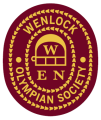Re-birth of the modern Olympic Games
In response to the National Olympian Association Festival, the Amateur Athletic Club, later to become the Amateur Athletics Association and now Britain’s ruling athletics body, was hastily formed by an elite who were determined that British sport should be restricted to “amateurs and gentlemen”, in other words athletes from the public schools and the universities of Oxford and Cambridge, and should be under their control with its base in London. The NOA faced powerful opposition but by its very existence, forced the AAA to open its doors to ‘every grade of man’.
For Queen Victoria’s jubilee, in 1877, Penny Brookes requested an Olympian prize from Greece for this special year. In response to this petition, King George I sent a suitably inscribed silver cup which was presented at the National Olympian Games held in Shrewsbury. This brought Penny Brookes into contact with His Excellency J. Gennadius, the Greek Charge d’Affaire in London.
The Greek newspaper Clio, in June 1881, reported that “Dr Brookes, this enthusiastic philhellene is endeavouring to organise an International Olympian Festival, to be held in Athens ….”.
Sadly the Greek nation was still in a time of change and despite both Gennadius’s and Penny Brookes’s enthusiasm, the Greek government politely declined.
In 1889, Baron Pierre de Coubertin, the organiser of an International Congress on Physical Education, appealed for information through the English newspapers. Penny Brookes responded. The Baron was so impressed that at the old doctor’s invitation, he visited Much Wenlock in October 1890. A meeting of the Wenlock Olympian Games was arranged in his honour.
At this time the two men discussed their similar ambitions and further, Penny Brookes, then aged eighty one, shared with the young twenty seven year old ‘Coubertin his dream of an Olympic revival, an international Games to be staged in Athens. On his return to France de Coubertin gave a glowing account of his stay in Much Wenlock and referred to his host’s efforts to revive the Olympics.
He wrote in his article for the December issue of ‘La Revue Athletique’ –
” If the Olympic Games that Modern Greece has not yet been able to revive still survives today, it is due, not to a Greek, but to Dr W P Brookes”.
Their respect was mutual, de Coubertin referred to the doctor as ” my oldest friend”. Although Penny Brookes was listed as an honoury member of the 1894 Congress, he was unable to attend because of ill health. Regrettably he died just four months before the realisation of his life long ambition; to launch the first International Olympic Games held in Athens in 1896, and so did not see his dream come to fruition. Brookes has not , until recent years, been given his due recognition of his contribution to the re-birth of the modern Olympic Games.
The Zappas’s Games, as referred to earlier, open to subjects of the Greek nation, continued to function intermittently with varying degrees of success right up until the revived International Olympic Games in 1896.
Wenlock Olympian Society maintains the original ideals of William Penny Brookes. The Olympian Society Committee comprises approximately 20 members , both male and female. The current range of affiliated clubs and societies include Athletics club, Bowling club, Fencing club and a Live Arts Society, all of which are represented on the main committee . The main committee business meetings takes place 4 times per year with an AGM in the Autumn. The business meetings are primarily for the purpose of developing and planning for the subsequent Games. These annual Games are generously subsidised by local businessmen and women and through some national bodies. The Societies own limited funds are also used.
